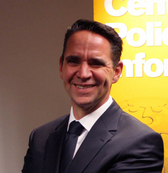Justin Longo is an Associate Professor in the Johnson Shoyama Graduate School of Public Policy at the University of Regina, and former Research Chair in Digital Governance. He has a PhD in public policy and public administration from the University of Victoria (2013) where he researched the use of enterprise social collaboration platforms inside government policy analysis settings. Following postdoctoral work in open governance at the Gov Lab@NYU and Arizona State University, his current research focuses on the social, organizational, and political implications of advancing technology. From the impact of the “sharing economy” on social and governance arrangements, to the unanticipated consequences of policy analytics, new ways of organizing work, and the evolving relationship between citizens and the state, the profound changes of the digital era provide the foundation for considering the trajectory of our shared future.
PhD Students
Abayomi Akintola is a doctorate candidate in JSGS. He was awarded the Queen Elizabeth II Scholarship (2020-2021). The focus of his research is on the adoption and application of big data analytics in the public sector.
Irene Nonyelum Azogu is a doctoral candidate in JSGS. She holds a master’s degree in Electronic Governance Technologies and Services from Tallinn University of Technology (Estonia) and a bachelors in Economics from the University of Ilorin, Kwara State (Nigeria). Her research is focused on exploring the role of ICTs in enhancing the engagement of marginalized groups in policy formulation processes. Irene’s research interests also include open governance, citizen and stakeholder engagement, participatory governance, strategic management in organizational development, as well as policy and procedural management.
Elizabeth Oluwatosin (Tosin) Olaniyi is a doctorate candidate in JSGS. She holds a master's degree in e-governance from Tallinn University of Estonia, and a bachelor’s in Intelligence and Security Studies from Afe Babalola University of Nigeria. Her research interests are in e-governance, environmental governance, and citizen engagement.
Navid Sarshar is a doctoral candidate in JSGS. He holds a bachelor’s degree in law and practiced as an attorney in Iran for five years. He also has a masters degree in public administration from JSGS (2018). His interest is digital governance, specifically the implications of the digital divide for new arrivals to Canada.
Mike Staffen is a doctorate student in JSGS.
Temofe Isaac Akaba is currently a PhD student in JSGS. He holds a master’s degree in E-Governance Technologies and Services from Tallinn University of Technology (Estonia), and a bachelor’s degree in Business Administration from the University of Benin (Nigeria). Temofe’s research is focused on exploring the adoption of service design in Canada’s public service delivery. His broader research area includes digital co-creation, open government, new technology adoption and governance, design thinking, and user experience research.
Yasmine Wafa is a PhD Student in JSGS. She is a deputy director at CCR2P - R2P & Women's Rights division. She is also passionate about sustainability and has spent 2020 volunteering as a senior SDG Coordinator with UN. Her research interests focus on teleworking, digitalization, and big data.
Steve Wyatt is a PhD Student in JSGS.
Master of Public Policy (MPP) Students
Prince Anim holds an MPP from JSGS and is a Research Associate in the Digital Governance Lab. Before joining JSGS, Prince cofounded TransGov — Ghana’s first digital public engagement platform for engaging the public and monitoring developmental projects. He also worked as an Executive Intern at the Digital Strategy and Operations Department of the Government of Saskatchewan. He is interested in government’s use of technology to support the quality of life of its people. A blog post on his master thesis research can be found here.
Mehrdad Safaei is a Data and Artificial Intelligence Program Analyst at the Digital Academy, Canada School of Public Service, Government of Canada. They also work as a research assistant at Simon Fraser University and JSGS. Their recent research includes investigating the capability of artificial intelligence to generate plausible, persuasive, and useful policy analysis and performing Twitter sentiment analysis for "Attributions of Blame and Credit in Policy-Making". Mehrdad's areas of expertise are AI, ML, smart cities, evidence-based decision-making, data analysis, technology and innovation policy, open governance, and digital governance.
Kedist (Katie) Sahlu holds an MPP from JSGS. Her thesis on facial recognition technology can be found here.
Tanushree Das, a development practitioner from Bangladesh with an academic background in Information Technology, is an MPP student at JSGS. She has a bachelor's degree in IT from Gujarat Technological University (India), earned under an ICCR scholarship. After working as a deputy manager (Microfinance) of BRAC, Bangladesh, she joins JSGS aiming to gain a deeper understanding of the inclusion of marginalized and excluded population’s interests in the policy formulation process. Her research interests focus on the use of technology in social and governmental interventions and inclusive organizational development.
DGL Alumni
Yassine El Bahlouli holds a masters degree in public policy from the Johnson Shoyama Graduate School of Public Policy. His thesis on “How Parliamentarians Use ICTs“ was successfully defended in October 2019.
Yassine has an IT Engineer Credential from Paris 8 University and an MBA in International Management from "Ponts et Chaussées School" in Paris. He held the position of Adviser to the Speaker of the Moroccan Parliament and led, from 2014 to 2016, the E-Parliament Project. Yassine is currently pursuing a PhD at Laval University researching blockchain and new governance in education. He can be found at http://opengov.elbahlouli.com/
Syeda Tashfia Sadaf holds a masters degree in public policy from the Johnson Shoyama Graduate School of Public Policy. Her thesis on “Training Tomorrow’s Intelligence-Amplified Policy Analyst: A Public Administration Curriculum for the Digital Era“ was successfully defended in October 2019.










